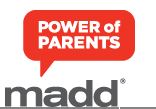Underage Drinking: Handle Tough Questions
Parenting a teen can be challenging! But hang in there—talking with
your teen is an important part of helping keep your family safe.
Fortunately, you can improve parent-teen communication simply by learning how teens reason and make choices. (Hint: It’s different from adults!) You can also learn communication strategies that encourage teens to come out of their shells. Find these insights, tips, and techniques in MADD program brochure.
Isn’t it better for parents to give teens alcohol under supervision? Won’t we help them learn to drink responsibly that way?
Parents, of course, have the choice of how to raise their own children. But you might want to consider lessons from science before handing your son or daughter a drink.
Research shows that when parents give alcohol to kids, those children are more likely to get into alcohol-related trouble and they’re more likely to drink to get drunk than other young people. Giving kids a drink—even with the best of educational intentions—actually increases their risk.
Is it okay to offer my child’s friend a tiny drink, under responsible adult supervision?
The law prohibits giving alcohol to someone else’s child.
Isn’t it true that in Europe, where kids are permitted to drink earlier, they have fewer alcohol problems?
That’s a common myth. Actually, Europe has more alcoholism and more young people drinking to excess than America. Europeans do have fewer alcohol-related traffic crashes, probably because they walk and take mass transit (such as the bus, train, or subway) much more often than Americans, but that is across all age groups.
We’ve never seen any studies that demonstrate a good outcome from allowing children to drink. On the contrary, research shows that allowing underage children to consume alcohol increases risky drinking and related problems.
When my teenage son argues that his friends all do something I’ve forbidden, what should I say?
First, assure your teen that his/her safety is your first concern. Then help him/her recognize flawed reasoning. (See here for an example.)
Get more tips on how to handle these tough conversations by implementing the MADD Parent Handbook.
Isn’t my teen unique? How do I know that research studies and statistics apply to my child?
People are different—it’s true. Scientists can’t possibly study every single individual and cover all the variations, so they look at groups of individuals and use scientific practices to calculate statistics and draw conclusions.
All information presented on the website and in the MADD Parent Handbook is based on studies that underwent “scientific peer review.” That means multiple experts examined the research to ensure it is scientifically sound and can be generalized to many parents and children. We feel confident that we’re providing the best information that’s currently available.
As summer is almost here - be an educated parent, you will have safer and healthier teens!
Visit www.madd.org for more information.
Fortunately, you can improve parent-teen communication simply by learning how teens reason and make choices. (Hint: It’s different from adults!) You can also learn communication strategies that encourage teens to come out of their shells. Find these insights, tips, and techniques in MADD program brochure.
Isn’t it better for parents to give teens alcohol under supervision? Won’t we help them learn to drink responsibly that way?
Parents, of course, have the choice of how to raise their own children. But you might want to consider lessons from science before handing your son or daughter a drink.
Research shows that when parents give alcohol to kids, those children are more likely to get into alcohol-related trouble and they’re more likely to drink to get drunk than other young people. Giving kids a drink—even with the best of educational intentions—actually increases their risk.
Is it okay to offer my child’s friend a tiny drink, under responsible adult supervision?
The law prohibits giving alcohol to someone else’s child.
Isn’t it true that in Europe, where kids are permitted to drink earlier, they have fewer alcohol problems?
That’s a common myth. Actually, Europe has more alcoholism and more young people drinking to excess than America. Europeans do have fewer alcohol-related traffic crashes, probably because they walk and take mass transit (such as the bus, train, or subway) much more often than Americans, but that is across all age groups.
We’ve never seen any studies that demonstrate a good outcome from allowing children to drink. On the contrary, research shows that allowing underage children to consume alcohol increases risky drinking and related problems.
When my teenage son argues that his friends all do something I’ve forbidden, what should I say?
First, assure your teen that his/her safety is your first concern. Then help him/her recognize flawed reasoning. (See here for an example.)
Get more tips on how to handle these tough conversations by implementing the MADD Parent Handbook.
Isn’t my teen unique? How do I know that research studies and statistics apply to my child?
People are different—it’s true. Scientists can’t possibly study every single individual and cover all the variations, so they look at groups of individuals and use scientific practices to calculate statistics and draw conclusions.
All information presented on the website and in the MADD Parent Handbook is based on studies that underwent “scientific peer review.” That means multiple experts examined the research to ensure it is scientifically sound and can be generalized to many parents and children. We feel confident that we’re providing the best information that’s currently available.
As summer is almost here - be an educated parent, you will have safer and healthier teens!
Visit www.madd.org for more information.


